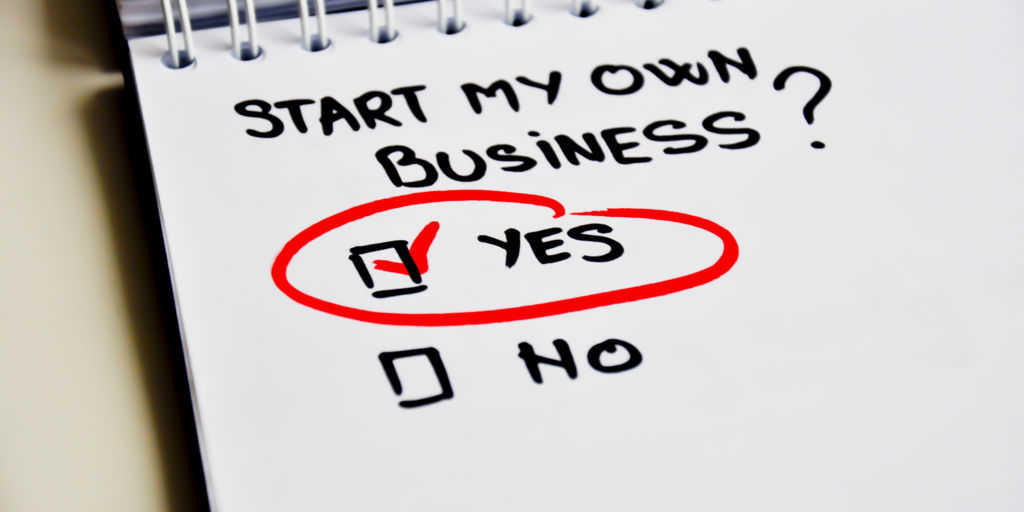Starting a business can often seem quite daunting. Many people dream of quitting their day job to become their own boss, but it can be challenging trying to figure out how to transform that dream into a reality.
Thanks to the UK’s thriving start-up scene and business-friendly regulatory environment, more and more entrepreneurs are realising that starting a business can be a fairly simple process.
Since the global financial crisis of 2008, the number of self-employed workers in the UK has shot up to 4.8m. According to the Office for National Statistics, the self-employed now account for around 15% of the UK’s total workforce. Those people collectively own almost 3.9m companies all across the country.
- Our All-Inclusive Package - the perfect way to set up a company
- What is company formation?
- How to write a business plan as a start-up
- Our Full Company Secretary Service - taking care of your business
So, how did they do it? It all starts with a fantastic business idea. To help you get started, we’ve come up with a guide outlining how to get on the road to self-employment.
How do I come up with a business idea?
Oftentimes, one of the hardest parts of starting a business is figuring out where to begin. Some entrepreneurs are lucky enough to stumble upon a brilliant idea unintentionally. Unfortunately, it’s not that easy for most people. The majority of self-employed workers need to think long and hard about what they want to do and how to turn it into a viable business.
If you’re starting from scratch and haven’t got any ideas for a new business, one way to set the cogs in motion is to ask yourself ‘what’s the next big thing?’ The most successful start-ups are typically businesses that are ahead of the curve. So, you should sit down and think about the industries that interest you. Then, do a bit of research and brainstorm up-and-coming trends that you could capitalise on within that industry.
Find a niche
You should also try to look for some sort of niche. Have a think about big industry players and what it is they’re offering customers. From there, try to figure out what they’re not offering customers. Sometimes, great businesses don’t try to reinvent the wheel – they simply look to fill an existing gap in the market.
Another way to come up with an idea for your new business is to write down a list of your skills, then brainstorm how those skills could be useful in a different sector or field. For example, how could you apply computer skills to the catering industry? Or what could your engineering experience bring to the agricultural sector? It might not be obvious at first, but these sorts of comparisons and exercises can lead to fantastic ideas for starting a business.
Finally, if you really can’t come up with a new business idea, just take a look at all of the products and services you use on a daily basis. Are there any products that you think you could improve? More importantly, think about whether you might be able to offer a particular item or service at a cheaper price. This is often a brilliant way to set the wheels in motion, and it can lead to proper innovation further down the line.
What is market research – and why is it important when starting a business?
Once you’ve come up with a great idea for your new business, you will need to figure out how it will fit into the wider business ecosystem. The best way to do that is to conduct market research.
Market research is simply the process of gathering information about the viability and feasibility of a business idea. By conducting market research, you’ll be able to develop a firm idea of how your target customers will react to your business and products. Market research will also help you to develop the foundations of your new business plan.
Why should you conduct market research before starting a business?
Without external feedback on your business idea, you won’t be able to make informed decisions about how to make your business a success. Your initial market research should be able to answer for these four Ps:
- Product – You might think you’ve come up with an incredible idea, but you need to ask your target customers what they think of your idea
- Price – Once you’re satisfied that there is existing demand for your product or service, you must establish a price point. The best way to do this is by taking a look at potential competitors and how much they’re selling their products for. You also need to ask potential customers what they would be willing to pay
- Placement – You need to determine the best place to set up your new business, as well as where and how to distribute your products. A good place to start is by comparing the characteristics and value of various locations
- Promotion – Research the best ways to reach your target audience. Figure out who your customers are, and think about what types of marketing, publicity, and branding will speak to those individuals
That’s what your initial market research should be able to tell you. But how do you get started?
One of the easiest ways to gather information is to create a survey for prospective customers. Surveys can be time-consuming, but they are cheap. You could even start with your own friends and family. Surveys can be conducted in person, by phone, by email, or online. If you need help, there are lots of free survey generators on the internet.
If you’re planning to create a survey, try to keep it short and easy to read. Avoid asking general questions – get as specific as you can. For example, rather than asking people what they like about going to the cinema, ask them what they don’t like about their local cinema. Don’t ask leading questions, don’t be ambiguous, and always pre-test your survey to find out if any of your questions are confusing or irrelevant.
Don’t forget to analyse your competition
It’s also important to analyse your competition. You need to figure out everything you can about the businesses that are already providing goods or services similar to the ones you want to offer. This research often starts online. Take a look at how many locations your competitors have, where they’re based, and what they sell.
Figure out where and how your competitors are promoting their business, what prices they charge, and how those products are received. Above all else, pay your competitors a visit to develop first-hand knowledge of their customer experience.
These sorts of research methods are called primary research. Secondary research methods can be equally useful, and there is a lot of them out there. Secondary research uses information gathered by other people or organisations to firm up your business idea.
Start by having a look at reputable statistics relating to your industry or target market. Trade bodies and government agencies often provide extensive online reports that are freely available to the general public. These reports will provide you with a bigger picture of your industry.
You can learn more about the economic conditions your business will be operating in, what sort of trends are influencing your chosen industry, and the consumer behaviour that is prevalent amongst your target demographics.
It’s often tempting to rush through the market research stage because it is time-consuming and rather tedious. But this research is fundamental to the success of your business. You need to arm yourself with all the facts about your new industry in order to make informed business decisions, even if it means putting your dreams on hold for a couple more months.
What is a business plan and why do I need one?
After you’ve learned about the industry you want to enter, it’s time to start thinking about how you’re going to write your business plan.
A business plan is essentially a written document that describes everything there is to know about your new business. It should cover everything from your business objectives and strategy to your products, sales, marketing plan, and financial forecast.
That might sound like pointless administrative work, but developing a business plan is essential when starting a business.
Get it down on paper
First and foremost, writing down everything you know about your proposed business is incredibly beneficial. By putting it all on paper, you’ll be able to hone in on your idea, set benchmark goals, and come up with ways to measure your progress and success. More important still, reviewing your plan will enable you to spot potential oversights or mistakes you’ve made during your initial planning stages.
Business plans aren’t just for your benefit, though. If you’d like to secure a business loan from a bank, the government, or other types of investors, they’re going to want to see your business plan to ensure you won’t be wasting their time and money. That’s why you need to think long and hard about your business plan. You may even need to revise it multiple times before it’s ready to be shared.
So, how do you write a business plan? There are lots of business plan templates online that can help you to structure and format your plan, but they all tend to address certain points.
You need to start by explaining what your business is, what goals you’d like to achieve, and how you plan to achieve them. Most business plans do this by including a strategy with action items spanning between one and five years into trading. Your business plan should also include detailed outlines of your products or services. Avoid jargon where possible, and spell out to potential investors what makes those products stand out.
Include the market research you’ve gathered about your competitors, market trends, and the industry as a whole. You should also think about a marketing plan, sales policies, and how you will structure and manage your new business.
Finally, you’ll be expected to include some form of financial forecast indicating how you expect your business to perform. Many banks also like to see the inclusion of a SWOT (strengths, weaknesses, opportunities, and threats) analysis.
The bottom line
Starting a business is often a long and winding road, but that doesn’t mean it needs to be difficult. Think carefully about what you’d like to do, research how your idea could operate as a viable business, and then sit down and write a detailed plan that will clearly prove to others why your business is destined for success.
That’s certainly not the end of the journey. There’s plenty more to do before your dream of starting a business turns into a reality. For one, you’ll need to decide whether to set up a limited company or operate as sole trader. But the steps we’ve outlined above are where it all starts, and they will inevitably go on to form the solid foundations of your new, thriving business venture.
Please note that the information provided in this article is for general informational purposes only and does not constitute legal, tax, or professional advice. While our aim is that the content is accurate and up to date, it should not be relied upon as a substitute for tailored advice from qualified professionals. We strongly recommend that you seek independent legal and tax advice specific to your circumstances before acting on any information contained in this article. We accept no responsibility or liability for any loss or damage that may result from your reliance on the information provided in this article. Use of the information contained in this article is entirely at your own risk.












Join The Discussion
Comments (6)
Can a dependent visa holder start business in the UK for selling products online?
If yes, what type of registration is needed?
Thank you for your kind enquiry.
A person of any visa status can become a shareholder and/or director of a UK limited company. Any limited company by shares should be suitable for your needs, and you will not require any documents to enable you to form a company. For more information, please visit this webpage informing of you of what you need to form a limited company: https://www.1stformations.co.uk/company-set-up-guide/
I trust this information is of use to you.
Kind regards,
John
Hello this is Leo Harry. I agree with you because customer care is very important in every business.
Hi Leo
Thank you for your comment and kind words with regards to our blog.
Kind regards,
John
Hi I’m Gwen and new here, I’m glad I found this website so helpful, I’m Ghanaian from west Africa and I want to import organic shea butter to UK and other parts of the world, but I don’t know how to, I was hoping if you could help me with any advice, thank you
Hi Gwen
Thank you for your comment and kind words with regards our website.
With regards importing goods to the UK from a non-EU country, I am no expert on this on particular area; however, please use use this link to the UK government’s website pages on the subject of ‘Starting to Import: https://www.gov.uk/starting-to-import.
Within these pages is an Overview section, together with information on importing from non-EU countries, VAT on services, and import licences and certificates which covers animals, plants and agricultural products.
I trust the above is of some assistance.
Kind regards,
Graeme